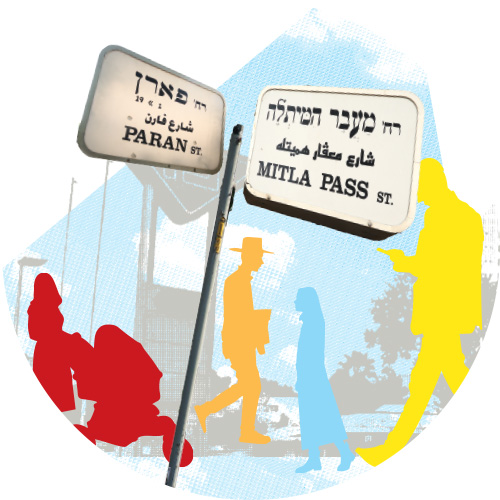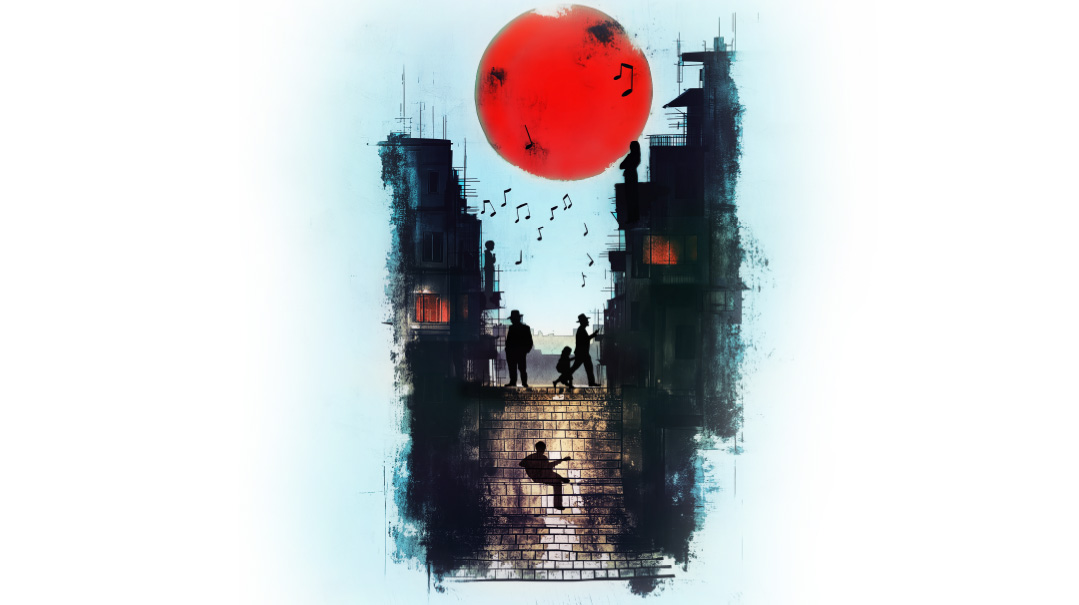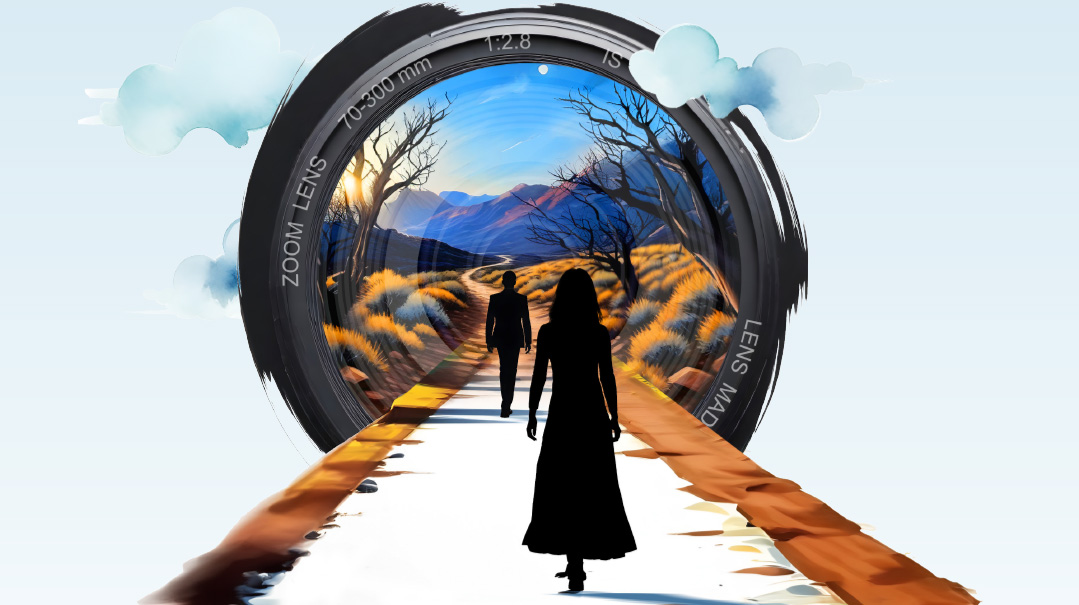Growth Curve: Chapter 14

He hadn’t davened Shacharis today, never even put on tefillin. He’d been so desperate to run, to hide, that he had forgotten who he was

The road shimmered with heat, and the hills on both sides were an endless parade of unchanging brown punctuated by the occasional scraggly bush or jagged crack. Benny wasn’t sure what had pulled him toward Midbar Yehuda after dropping off the kids at gan. He knew it wasn’t technically legal to ride his bike on an intercity highway, that he could probably get in trouble if a cop spotted him. But it wasn’t logic at work here; something inside of him craved surroundings that matched the desolate landscape of his soul.
The electric bike passed the exit to Mitzpeh Yericho, buzzing hard as the road curved and dipped. Benny turned right onto Route 90. The road stretched ahead, snaking relentlessly into the desert.
He kept riding and noticed a sign for the Qumran Visitors Center. Benny wasn’t a museum person, but he decided to check it out.
He paid the entrance fee — it was less than 30 shekel, nothing major — and wandered through the building. The museum was small, and most of its offerings revolved around explanations and depictions of ancient urns, parchment fragments, and ascetic scribes who had left civilization more than a thousand years ago to live in this hostile territory.
Benny understood why they had left polite society for these caves. You couldn’t rely on polite society when you were down and out. You couldn’t count on privileged people like Ephraim Grossman, who lived in Ezras Torah, probably in a million-dollar dirah that some rich grandfather had bought him.
Grossman could afford to work at Ner Olam; he didn’t need the salary to pay his grocery bill. Benny could just picture him bragging about it on his trips back to America, telling his admiring old uncles, “I work with bochurim, try to show them what learning is really all about.”
Benny left the museum and guided his bike across the road to the edge of the startlingly blue-green water. He got off the bike, settled on the ungiving ground, and stared at the water for a long time. Except for the roar of the occasional truck on the highway, it was quiet. Just sky, earth, and a strip of water striving and struggling to grow and give, but never nurturing any life. A Dead Sea.
The sun was directly overhead now, and it was sending rivulets of sweat down Benny’s back. He was getting sunburnt, he could feel that stinging sensation across his cheeks and nose, but the pain felt good, it felt right.
At some point — was it minutes later? Hours? — the horizon began to shimmer. Benny tried standing and had to clutch his bike to avoid stumbling. He was parched, he realized, and had to drink something before he got too dizzy to move.
Before turning onto Route 90 earlier this morning, he had noticed a rest station. He got back on the bike and rode until he found it — the Lido rest stop. A camel was pacing skittishly around the parking lot, covered by a colorful Bedouin blanket with tinkling bells along its hem. Its owner looked hopefully at Benny. Do I really look like a thrill-seeking tourist? he wanted to snarl, but he shrugged instead.
He bought a two-liter bottle of water, sat down at a picnic table, and swigged the whole thing down quickly. His head was starting to hurt. He bought another big bottle and drank it all too. Little daggers were stabbing his forehead fiercely now.
After everything you gave the guys, everything you did for them, the daggers were needling. After all that, they didn’t need you so badly after all. Not your food, not your music, not the DMCs or chizuk or inspiration.
Benny sat there for a while, holding the anger, the betrayal, the bitterness. A weak breeze began to blow, and he realized the sun was dipping down, and the sky was stained pink. Wait, he hadn’t davened Shacharis today, never even put on tefillin. He’d been so desperate to run, to hide, that he had forgotten who he was.
Feeling awkward, he entered the grill restaurant and approached the guy behind the counter.
“Ken, atah rotzeh l’hazmin?” the guy asked brusquely.
“Lo b’diyuk, not exactly,” Benny said. “I wanted to ask you — are there any tefillin around here? Ani tzarich l’hitpallel.”
The guy glared at him suspiciously, then shrugged. He led Benny to a battered Skoda parked at the edge of the lot, opened up the trunk, and pulled out an embroidered tefillin bag.
“Kach,” he said.
Benny found a deserted corner, wrapped himself in the stranger’s tefillin, and davened Minchah. Then he repeated Shemoneh Esreh, a pathetic offering to make up for the Shacharis he’d missed. He wanted to pour his heart and soul into it, like David Hamelech who’d fled to these same colorless hills with their scraggly bushes and sunbaked surfaces pleading for water, who’d infused a lifetime of pain and rejection into his prayers.
But he was no David Hamelech. He was a small, dumb kid pretending to be an adult. A kid who failed at every important thing he’d ever tried to accomplish.
The sun was almost invisible now, and overhead, the pinks and reds of the last two hours were fading into purple. Soon it would be dark. Benny had to get back to civilization.
He took off the tefillin, stowed them in the bag, and went back inside the store. “Todah,” he said, placing the bag on the counter. The guy nodded.
Benny went back outside to his bike. He strapped on his helmet, sat down, and switched it on. Nothing happened.
He tried again. A weak sputter, then nothing.
The bike was out of batteries. What should he do?
Benny unstrapped the helmet. Think, think. There were definitely Egged buses that took this road back to Yerushalayim. But did they still operate at night? He had a Rav Kav in his pants pocket, but where was the bus stop, anyway, and which number bus did he need? His head felt like it was going to crack soon. It literally hurt to think.
Maybe he should hitch a ride home. Was he ready to go home, to face Tziporah and the silent house and those folding tables? A car roared by, blasting whiny Arab music. Nah, hitching wouldn’t be safe. But he couldn’t spend the night here in the desert — coyotes and jackals weren’t safe either.
He paced the parking lot as the shadows deepened and night overtook the desert. The headache had moved to the back of his head, a dull, steady presence that had him squinting in pain. He was tired, so tired. So spent.
Inside the Lido grill restaurant there was safety and air conditioning. He could probably rest there until he felt a little better.
Benny entered the restaurant. He bought a can of soda and a bag of Bissli, and sat down at a table as far as possible from the group of young, loud soldiers in uniform. The Bissli tasted like cardboard.
The soldiers were talking animatedly, their faces aglow with teenage confidence in the future. What was Benny’s future? He knew he had a gift but he didn’t know, after the disastrous Melaveh Malkah, if he could ever work in Ner Olam again. And he couldn’t afford his rent. Maybe it was time to give up, go back to the US, give Tziporah the life she deserved.
Tziporah. She was probably frantic.
Was he ready to face her? Ready to talk to her for real? He wasn’t sure.
It wasn’t like she wanted to talk to him either. She hadn’t called him even once this entire day. And these past few weeks she’d been so distant, so disapproving — questioning and doubting his plans and making it clear she didn’t trust him.
The restaurant seemed to be shutting down; some guy was stacking the chairs and washing the floor, and the kitchen staff was filing out. It must be late. Benny pulled out his phone to check the time. Wait, his phone was off. It had been off the entire day — had he ever turned it on after Shabbos? He’d been so consumed by the Melaveh Malkah, getting the house ready, picking up the bagels….
He turned it on now. Ten-fifty-eight p.m. Whoa! It was so late, the entire day and most of the night were gone! He should call Tziporah, he really had to call Tziporah.
What was he going to say?
Suddenly the phone rang. It was a US number. Strange.
Benny cautiously took the call.
“Hey, Benny my man, how are you? How are things?” The voice was strong, confident, warm.
“Dave!” Benny said. “Is that really you?” Why was Dave Rothman calling him here in the desert?
“Yeah, it’s me, great to hear your voice,” Dave said. “You have a few minutes, Benny?”
The guy had finished cleaning the floor and was motioning to Benny to leave. He probably wanted to shut the lights, lock up, and go home. Benny heaved himself out of the chair and walked dizzily back to the parking lot. A lone light illuminated the picnic table. He sat down and tried to focus on Dave.
“Sure, for you I have more than a few minutes. Tell me what I can do for you,” Benny said.
“So, it’s like this,” Dave said. “Remember I came to Israel recently — of course you remember, we had that great meal in Entrecote with the Moroccan carrots, and you showed me around the beis medrash at Ner Olam, right? So anyway, I didn’t just come for that.
“I’ve been thinking for a while about starting a branch of my business in Israel,” he explained. “It’s a different model than what I’m used to — here in America I own big rental properties, but in Israel everyone’s focused on buying, so the rental market is much narrower, and you have to be very calculated.”
“Hmm,” Benny said. His head felt fuzzy, but he tried to sound alert.
“So, this is the strategy,” Dave said. “I’ve been focusing on the new apartments on the top floors of all those Tama buildings — you know, the contractor reinforces and expands the existing apartments in these older neighborhoods, and then he gets to add a few stories, to build and sell some luxury apartments. So I bought a bunch of those apartments in Anglo areas, where there are young American and British couples looking to rent.”
“A bunch of apartments?” Benny said stupidly. For some reason, the face of Modche Kroizer floated in front of him, superimposed on Dave Rothman’s custom sports jacket and velvet loafers.
“Yeah, and if that project goes well, I’m going to take the next step and get into some of the bigger building projects — not rentals, obviously. Bigger things. You know me, Benny.” Dave sounded like that wide-eyed teen he’d once been back in Ner Olam. “I always have big plans, big dreams. But this time, I want you to be part of it. I need someone in Israel to help me run it, manage the properties, deal with the tenants… and I’m ready to offer a competitive salary, real money, if you’ll take real responsibility.”
Benny shook his head. Was Dave serious?
“Dave,” he managed, “this is not my thing. You know me, I’m not a businessman. I don’t do numbers or negotiations or anything like that.”
“Right, I know,” Dave answered smoothly. “But those are things you can learn. I’m looking for something more basic, and you have it. You’re a responsible guy who commits and sticks to it.
“Remember back in Ner Olam when we got stuck on that wild tiyul?” he continued, his voice warm with nostalgia. “The Darja, I think it was called — insane hike, right? So I sprained my ankle halfway through, and you said you would help me get to the end. Benny, I still remember leaning on your shoulder for miles. I remember how you helped me swim through that horrible pea-soup water in the caves. During the last stretch you were basically carrying me. You said you would make sure I got to the end, and you did.
“And remember during second year,” Dave was talking faster now, “you said you were going to make a siyum on the yeshivah masechta, take it all the way to the end? It sounded impressive, but I had my doubts. Bava Kamma is loooong.
“Then we had that week of straight rain, it was legit freezing in the dorm, and you got the flu. You were in bed with fever for like ten days, shaking like a drunk. I thought you would for sure drop the siyum idea, but you kept going.
“And then before Purim your dad came to visit and wanted you to move into the hotel with him for a week, but you told him you could only come at 12:30 at night because you couldn’t skip night seder, you had too much to cover.
“And then it was sof zeman, and everyone was pumped about the big inter-yeshivah baseball game, and you skipped it and said no, I’m making my siyum, I have to finish.”
Benny listened, dazed, as Dave painted a picture of a guy he no longer recognized.
“And then I came to visit this spring,” Dave’s voice caught with obvious emotion. “And I couldn’t stop thinking about you when I got back to Monsey. Still the same Benny, still the same rock of a guy — you took that commitment to a whole new level and really stuck with it all these years.
“That’s the kind of guy I want to work with,” Dave finished. “That’s Benny Muller.”
Benny breathed in and out in the silent parking lot. Maybe this is the way out, he thought. Maybe this is it.
“You’ll let me know, Benny, right?” Dave sounded tentative for the first time this entire conversation. “I mean, I know this is a big deal, a big change. Discuss it with your wife, take a week to think about it. And then call me back. I really think this can be great for both of us.”
“I will,” Benny mumbled. His head was thudding to a dull drumbeat of pain and wooziness. “Thanks, Dave,” he remembered to add. “You’re a real friend.”
He had to call Tziporah, talk this out with her, tell her he was safe. He just needed to close his eyes for two minutes and get his brain working again, so the words would come out right.
He put his head down on the picnic table and finally, for the first time since Friday night, he fell asleep. The phone buzzed and rang, rang again, then started to emit warning sounds. The battery was low, lower, dead… but Benny Muller didn’t hear a thing.
to be continued…
(Originally featured in Mishpacha, Issue 937)
Oops! We could not locate your form.



